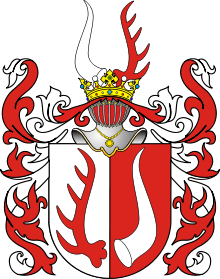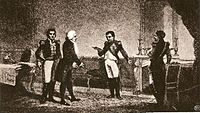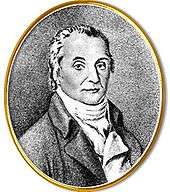Józef Wybicki
Józef Rufin Wybicki (Polish pronunciation: [juˈzɛf vɨˈbʲit͡skʲi]; 29 September 1747 – 19 March 1822) was a Polish nobleman, jurist, poet, political and military activist. He is best remembered as the author of "Mazurek Dąbrowskiego" (English: "Dąbrowski's Mazurka"), which in 1927 was adopted as the Polish national anthem.
Józef Wybicki | |
|---|---|
| Coat of arms |  Rogala |
| Born | 29 September 1747 Będomin, Pomerania, Poland |
| Died | 10 March 1822 (aged 74) Manieczki, Schrimm, Prussia |
| Noble family | Wybicki herbu (coat of arms) Rogala |
| Spouse(s) | 1. Kunegunda Wybicka, née Drwęska (1773–1775) 2. Estera Wybicka, née Wierusz-Kowalska (1780) |
| Father | Piotr Wybicki |
| Mother | Konstancja Wybicka, née z Lniskich |
Life
Wybicki was born in Będomin, in the region of Pomerania in the Polish–Lithuanian Commonwealth.[1] His family was Pomeranian nobility.[2]
He finished a Jesuit school, and in his youth was a junior court official.[2] Wybicki was elected a deputy to the Repnin Sejm, the session of Polish parliament in 1767, on the eve of the First Partition of Poland.[1] Subsequently he joined the insurgency known as the Confederation of Bar (1768–1772), aimed at opposing the Russian influence and king Stanisław August Poniatowski.[1][2] He was one of the advisors (konsyliarz) of the Confederacy, acting as a diplomat.[3] After the failure of the uprising, he spent some time in the Netherlands, studying law at Leiden University.[2]

Returning to Poland, in the 1770s and 1780s he was associated with the Commission of National Education.[1] He supported King Stanisław August Poniatowski and his proposed reforms.[1][2] He helped draft the liberal Zamoyski Codex of laws of the late 1770s.[4] He was a Patriotic Party activist during the Great Sejm (1788–92) – though he was not one of its first deputies, during much of that time staying at his estate, writing and staging operas.[1][2] He did, however, participate in the Great Sejm's deliberations, beginning in 1791.[4] In 1792, in the aftermath of the Polish–Russian War of 1792, like many of Poniatowski's supporters, he joined the Targowica Confederation.[5]
He participated in the Kościuszko Uprising (1794)[1] and was a member of the Military Section of the Provisional Council of the Duchy of Masovia.[6] After the failure of this insurrection he moved to France.[2]

He was a close friend of both Tadeusz Kościuszko and Jan Henryk Dąbrowski.[7] With Dąbrowski he organized the Polish Legions in Italy, serving under Napoleon Bonaparte.[1] In 1797, while in Reggio Emilia, Italy, he wrote Mazurek Dąbrowskiego (Dąbrowski's Mazurek).[1] In 1806 he helped Dąbrowski organize the Greater Poland Uprising.[2]
After the creation of the Duchy of Warsaw in 1807, he held a number of positions in its Department of Justice, and continued working for it after the Duchy's transformation into Congress Poland.[2] In 1817 he became president of the Supreme Court of Congress Poland.[8]
He died on 10 March 1822 in Manieczki, in Schrimm, then part of the Grand Duchy of Posen, Prussia.[1]
Works
Wybicki was a writer, journalist and a poet.[1] He wrote political-themed poems, plays and political treaties advocating reforms in Poland in the 1770s and 1780s.[1][2] His works of that time analyzed the Polish political system, the concepts of liberty, and advocated for more rights for the peasantry.[9] He would also publish more political brochures in the 1800s, advocating for liberal reforms in the Duchy of Warsaw.[2]
Mazurek Dąbrowskiego (Dąbrowski's Mazurka) remains Wybicki's most famous creation.[2] It has been regarded as an unofficial national anthem since the November Uprising of 1831.[1] In 1927 the Mazurka was officially adopted as the Polish national anthem by the Polish parliament (Sejm).[2][10]
See also
References
- Bolesław Oleksowicz. "Józef WYBICKI". VIRTUAL LIBRARY OF POLISH LITERATURE. Retrieved 7 October 2013.
- Omer Bartov (2007). Erased: Vanishing Traces of Jewish Galicia in Present-day Ukraine. Princeton University Press. pp. 121–122. ISBN 978-0-691-13121-4.
- Mariana B. Michalika (1994). Kronika powstań polskich: 1794 – 1944 (in Polish). "Kronika"-Marian B. Michalik. p. 10. ISBN 978-83-86079-02-5.
- Richard Butterwick (1 December 2011). The Polish Revolution and the Catholic Church, 1788–1792: A Political History. Oxford University Press. p. 285. ISBN 978-0-19-925033-2.
- Władysław Zajewski (1989). Józef Wybicki (in Polish). Książka i Wiedza. p. 10. ISBN 978-83-05-11947-4.
- Aleksander Kociszewski (1982). Pieśnią i szablą: rzecz o twórcy hymnu narodowego (in Polish). Iskry. p. 93. ISBN 978-83-207-0478-5.
- Agnieszka Barbara Nance (2008). Literary and Cultural Images of a Nation Without a State: The Case of Nineteenth-century Poland. Peter Lang. p. 141. ISBN 978-0-8204-7866-1.
- Jadwiga Lechicka (1962). Józef Wybicki (in Polish). Państw. Wyd. nauk. p. 167.
- Anna Grześkowiak-Krwawicz (17 August 2012). Queen Liberty: The Concept of Freedom in the Polish–Lithuanian Commonwealth. BRILL. pp. 126–127. ISBN 978-90-04-23121-4.
- (in Polish) Dziennik Urzędowy Ministerstwa Spraw Wewnętrznych. 1927, nr 1 i 2
External links
| Wikimedia Commons has media related to Józef Wybicki. |
- Biography at univ.gda.pl
- Memoirs of Józef Wybicki
- Free scores by Józef Wybicki at the International Music Score Library Project (IMSLP)